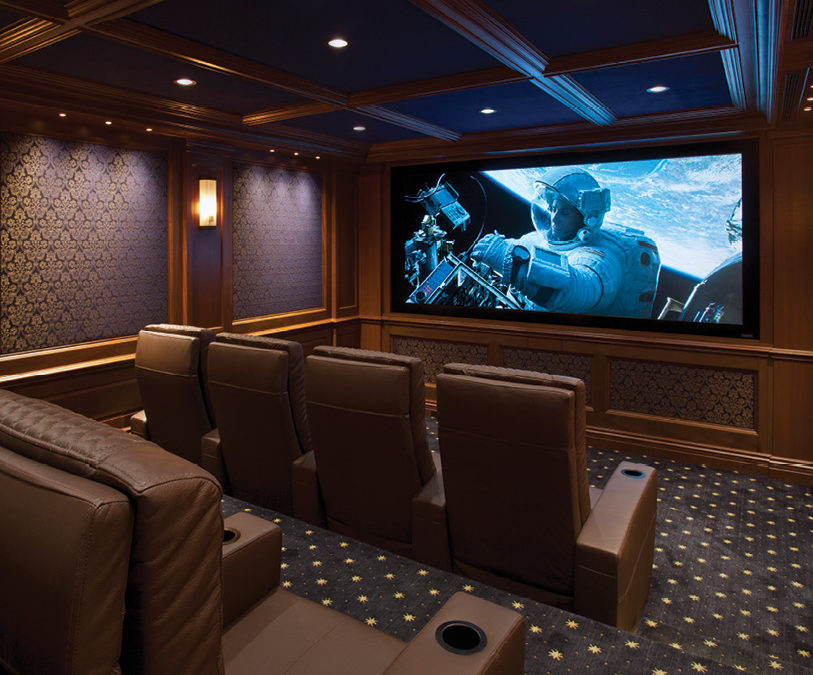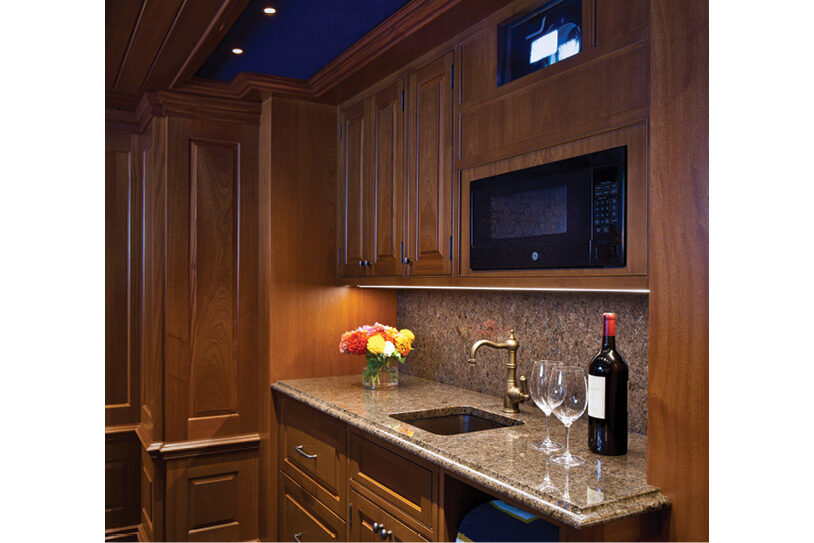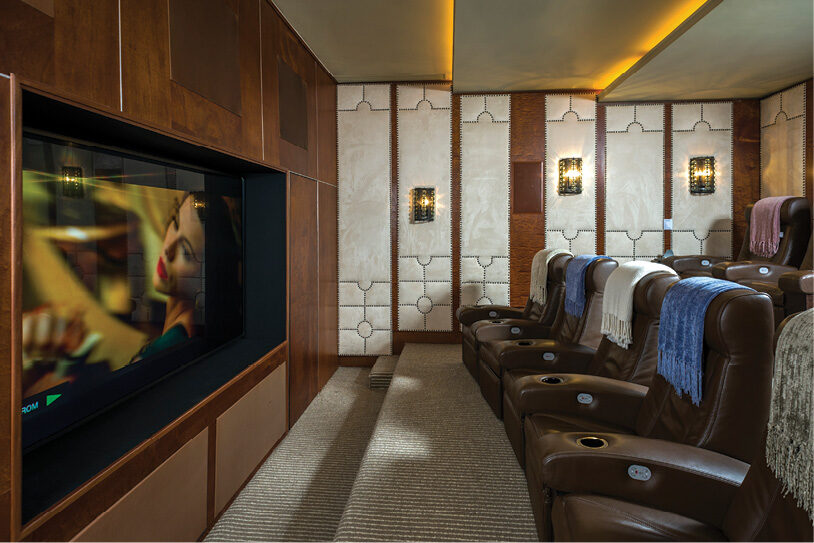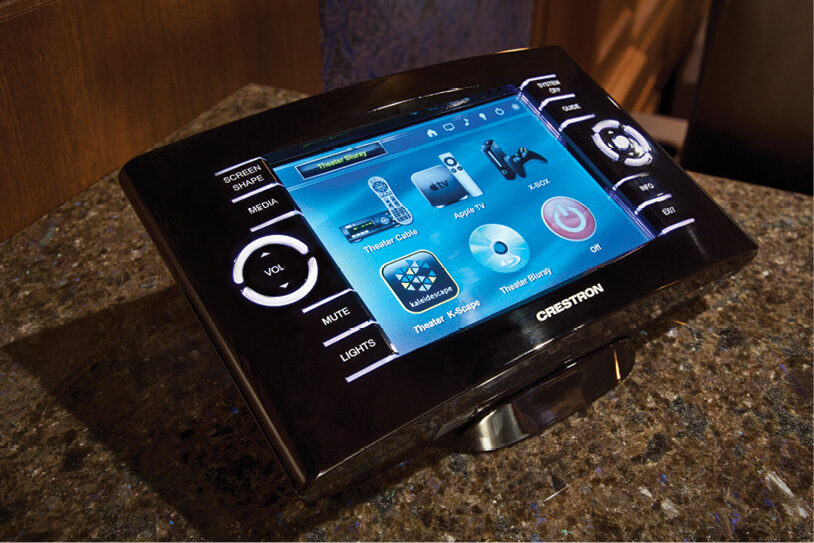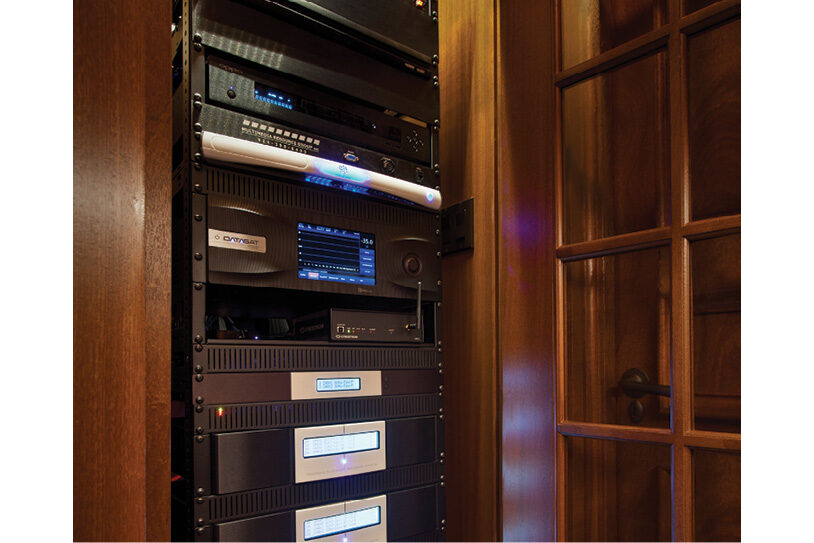In this Auro-3D theater, isolated power creates a clean slate for immersive sound and video.
 David Kepke, president of Multimedia Resource Group Inc., of Chappaqua, N.Y., believes that there are three pillars for any successful high-performance media room or home theater: room structure, equipment, and power. Sadly, homeowners often see power as a low priority when it comes to their wish list, he says. It’s one of the most misunderstood components that all too often requires a “sell” to the homeowner or gets cut when budgets are squeezed.
David Kepke, president of Multimedia Resource Group Inc., of Chappaqua, N.Y., believes that there are three pillars for any successful high-performance media room or home theater: room structure, equipment, and power. Sadly, homeowners often see power as a low priority when it comes to their wish list, he says. It’s one of the most misunderstood components that all too often requires a “sell” to the homeowner or gets cut when budgets are squeezed.
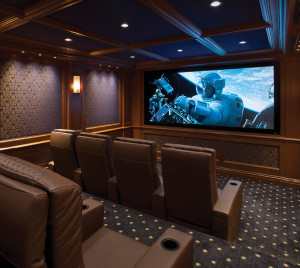 The Players
The Players
Systems Design & Installation – Multimedia Resource Group Inc., Chappaqua, N.Y.,
Architect – Soper Babcock & Associates LLC, Greenwich, Conn.,
Builder – R.R. Builders, LLC, New Canaan, Conn., rrbuilders.com
Video Calibration – Kevin Miller, ISFTV, East Patchogue, N.Y.,
Audio Calibration – Paul Hales, Pro Audio Technology , Lake Forest, Calif.,
Equipment
Control – Crestron
Surround – Sound Processing: Datasat
Video Projector: – Sim2
Screen – Seymour Screen Excellence
Video Processing – Lumagen
Speakers – Pro Audio Technology
Power – Torus Power
So, why then does power make up one-third of Kepke’s list of essential elements for a high-performance system? “Because if you don’t have good power, you can’t possibly have a good system,” he explains. “Everything we see and hear is essentially modulated power. So, it’s important that you start any system with clean power.”
As with most Multimedia Resource Group projects, equipment from Torus Power does the honors in this award-winning home theater, providing clean, isolated power to every component in the room.
The product engineers at Torus guided Kepke through the process of selecting a wall-mount (WM) balanced power isolation transformer unit (WM-45-BAL-AVR-TVSS), which offers transient voltage surge suppression, meaning it responds in less than five nanoseconds to power surges up to 80,000 amps, thereby offering outstanding protection of connected equipment. The wall-mount form factor not only saved rack space, it allowed the electricians to complete their wiring and clean up before Kepke and his team installed the equipment rack. “I didn’t want to bring in the rack and equipment until the space was dust-free,” says Kepke.
The Torus Power wall-mounted isolation transformer feeds clean power to the multiple Pro Audio Technology amps and speakers. “These speakers are extremely dynamic and neutral, so basically whatever you put into them, you are getting out of them. They offer really tight bass and great dynamics,” says Kepke. With these speakers, the homeowners can enjoy the latest in surround-sound technology–Auro-3D. Like Dolby Atmos and DTS:X, Auro-3D employs the placement of speakers above and around you to more accurately replicate realistic audio in the room.
When it came to installing the Pro Audio Technology speakers in the appropriate configuration for three dimensions of Auro-3D sound, Kepke had to address an existing steel beam that stretched across the back of the room. It caused the height of the ceiling to be lower than expected, and influenced the proportions of the wall panels. With the speakers located in the wall panels and behind the projection screen, Kepke had to make sure there was enough separation between the main speaker channels and the Auro-3D channels. He consulted extensively with both Auro-3D and Pro Audio Technology, and they collectively determined that there was indeed enough ceiling height to meet the correct specifications.
Processing all of this 3D audio is a Datasat RS20i–a professional audio system designed for high-end private cinemas. Its input/output capacity exceeds what would traditionally be required for most home cinemas, but the ability to fine-tune each channel is a huge benefit for systems of any size. “From the initial configuration, it was clear that this unit was unlike anything else I’ve used to date,” says Kepke. “The audio quality is so pure, even familiar content sounds different, bigger, more pristine.”
Kepke didn’t route the video signals through the Datasat unit, opting instead for aLumagen video processor to send video from the home theater components to a SIM2SuperLumis projector. The projector is outfitted with an anamorphic lens, giving the homeowner aspect-ratio control over content shining onto the acoustically transparent 2.35:1 (CinemaScope) Seymour Screen Excellence screen, which can mask to a narrower 16:9 aspect ratio.
A Crestron MC3 processor manages the audio and video equipment, plus 11 zones of Crestron lighting–all of which is controllable via a Crestron touchscreen. The homeowners can pick the appropriate mode for a desired activity, whether it’s watching a movie, intermission, or reading. Kepke designed the user interface on the touchscreen to be simple for anyone in the house to engage various functions. With the touch of a finger, the homeowner can view content from Verizon Fios, a movie on the Oppo Digital Blu-ray Disc player, Apple TV, or the Kaleidescape movie server.
As for the look and feel of the theater, the homeowner was very involved in the selection of the comfortable Cineak Ferrier seats with dual motorized headrests and footrests. He worked directly with Kepke and his team to customize the seats so they did not include the diamond pattern typical of this model on the armrest.
The gorgeous millwork is largely attributable to the architect, who spent hundreds of hours crafting its stunning details. All of the mahogany woodwork is more than just a pretty face, however; it’s actually the icing on the acoustical cake. The intricate details and alterations of plane aid in the acoustic performance of the room. Installed between each column is acoustically transparent fabric, behind which resides four inches of Fiberglass and air space. Kepke isolated the room from the rest of the home by using a double wall structure and installing two layers of QuietRock sheetrock and a layer of Acoustiblok sound-deadening material. When everything was complete, video guru Kevin Miller, president of ISFTV, East Patchogue, N.Y., calibrated the video to ensure a killer on-screen image, while Pro Audio Technology’s Paul Hales calibrated the audio. The result: incredible.
“When you execute these new three-dimensional surround-sound formats properly, the sound is truly like nothing else you’ve heard,” says Kepke. In the end, it was Multimedia Resource Group’s strict adherence to Kepke’s three pillars of a truly great room that helped make this theater a success–structure, equipment, and clean, isolated power to feed the system and provide a difference you can see and hear. EH
Krissy Rushing is an A/V publishing industry veteran whose experience spans more 15 years. From her early days as executive editor of Home Theater magazine, Ultimate AV, and Audio Video Interiors, to her more recent work as a freelance writer, Krissy specializes in making technology understandable to anyone.
